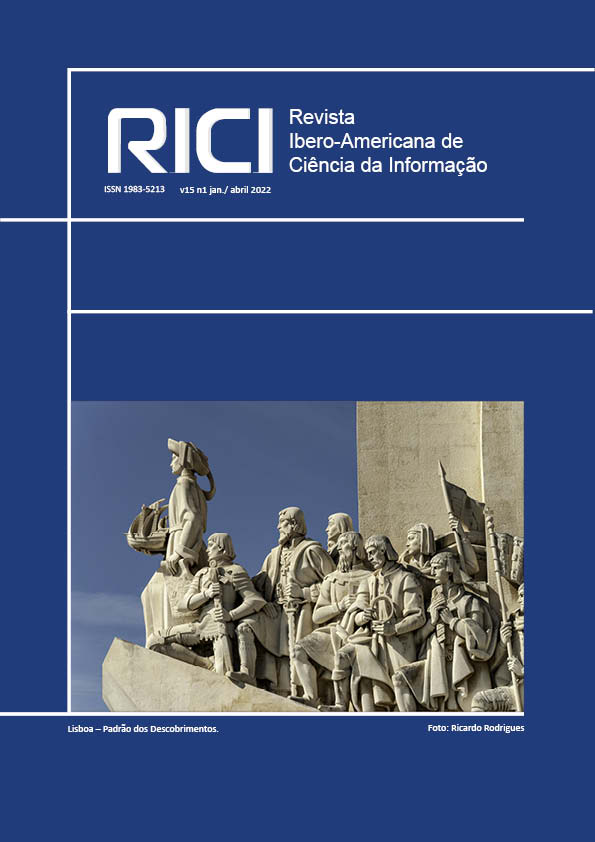Red Brasileña de Estudios y Colecciones Adaptadas (REBECA): retos y perspectivas en la colaboración de la asistencia informativa a las personas con discapacidad visual en Brasil.
DOI:
https://doi.org/10.26512/rici.v15.n1.2022.42463Palabras clave:
Redes de colaboracción, Discapacitados visuales, Accessibilidad informativa, Acervo en formato accessibleResumen
La formación de redes de colaboración ha contribuido a la mejora de las acciones inclusivas en las universidades, aportando nuevas perspectivas a las cuestiones de accesibilidad y favoreciendo el diálogo para la resolución de las demandas presentadas por las personas con discapacidad. La Red Rebeca es la primera red brasileña de colaboración de colecciones académicas en formato accesible. Su objetivo es reunir a las instituciones de educación superior que desarrollan los mismos productos y servicios, proporcionando cooperación técnica e intercambio de trabajos en formato accesible. Este trabajo tiene como objetivo presentar las actividades de la Red Rebeca y describir los procesos adoptados por los profesionales que están en los centros, laboratorios y bibliotecas accesibles a las personas con discapacidad visual en las Instituciones de Educación Superior (IES). Este trabajo se caracteriza por ser un informe de experiencia de las acciones desarrolladas por la Red. Los participantes en la investigación fueron profesionales de universidades públicas federales brasileñas. La metodología es el relevamiento bibliográfico sobre redes colaborativas en bibliotecas y el análisis documental de registros e informes en el período 2018 a 2021. En cuanto a los resultados, la Red reúne actualmente a 18 instituciones que suman 60 profesionales, beneficiando a unos 180 usuarios. Las actividades las llevan a cabo 06 grupos de trabajo con temas específicos, que son: comunicación, repositorios, normalización de manuales, audiodescripción, musicografía en braille y tutoría (para instituciones aspirantes). Se puede concluir que las acciones de REBECA aportan beneficios en términos de apoyo a los servicios bibliotecarios para las personas con discapacidad visual. Tanto en la orientación de normas comunes de buenas prácticas en la producción de materiales en formatos accesibles, como en la creación de bibliotecas digitales accesibles, en el intercambio de documentos e información técnica. El diálogo entre los profesionales que están en la primera línea de atención permite mejorar los procesos y fortalecer el enfrentamiento con la exclusión que aún persiste en las instituciones.
Descargas
Citas
BRASIL. Decreto n° 9.522, de 8 de outubro de 2018. Promulga o Tratado de Marraqueche para Facilitar o Acesso a Obras Publicadas às Pessoas Cegas, com Deficiência Visual ou com Outras Dificuldades para Ter Acesso ao Texto Impresso, firmado em Marraqueche, em 27 de junho de 2013. Brasília, DF: Presidência da República, 2018a. Disponível em: http://www.planalto.gov.br/ccivil_03/_ato2015-2018/2018/Decreto/D9522.htm. Acesso em: 30 ago. 2021.
BRASIL. Lei n° 13.146, de 6 de julho de 2015. Institui a Lei Brasileira de Inclusão da Pessoa com Deficiência (Estatuto da Pessoa com Deficiência). Brasília, DF: Presidência da República, 2015. Disponível em: http://www.planalto.gov.br/ccivil_03/_ato2015-2018/2015/lei/l13146.htm. Acesso em: 10 set. 2021.
CUNHA, Murilo Bastos da. Cooperação bibliotecária: a palavra-chave nos tempos atuais. Revista Ibero-Americana De Ciência da Informação, v. 11, n. 2, maio de 2018, p. 364-366, doi:10.26512/rici.v 11.n 2.2018.10932. Disponível em: https://periodicos.unb.br/index.php/RICI/article/view/10932/9598. Acesso em: 08 ago. 2021.
DANTAS, Gabriella Lima. Rede Brasileira de Estudos e Acervos Adaptados (REBECA): experiência de cooperação entre Instituições de Ensino Superior para fomentar a oferta de material informacional acessível para pessoas com deficiência visual. In: SEMINARIO HISPANO-BRASILEÑO DE INVESTIGACIÓN EN INFORMACIÓN, DOCUMENTACIÓN Y SOCIEDAD, 7., 2018, Madrid; Murcia. Anais eletrônicos [...]. Madrid: Universidad Complutense de Madrid, Universidad de Murcia, Universidade de Brasília, 2018. Disponível em:http://seminariohispano-brasileiro.org.es/ocs/index.php/viishb/viishbucm/paper/viewFile/516/31 Acesso em: 8 jul. 2021.
FERREIRA, Sueli Mara Soares Pinto; WALTER, Couto. Redes colaborativas para o acesso aberto: três maneiras de promovê-las. In: MELO, Francisco Ricardo Lins Vieira; GUERRA, Érica Simony F. M; FURTADO, Margareth Maciel Figueiredo Dias (Org.). Educação superior, inclusão e acessibilidade: reflexões contemporâneas. RJ, RJ: Campos dos Goytacazes: Encontrografia, 2021. 304 p. Disponível em: Educação Superior, inclusão e acessibilidade: reflexões contemporâneas - INCLUI. Acesso em: 29 set. 2021.
GIL, Antonio Carlos. Métodos e técnicas de pesquisa social. 6. ed. São Paulo: Atlas, 2008. 200 p. ISBN: 9788522451425.
INOMATA, Danielly Oliveira; VARVAKIS, Gregório; SOARES, António Lucas. Diretrizes para o gerenciamento dos fluxos informacionais em redes colaborativas: uma abordagem constituída a partir do design Science research. In: ENCONTRO NACIONAL DE PESQUISA EM CIÊNCIA DA INFORMAÇÃO – ENANCIB, 18., 2017. Anais… São Paulo, UNESP, 2017.
PONTE, João Pedro da; SERRAZINA, Lurdes. Professores e formadores investigam a sua própria prática: o papel da colaboração. Zetetiké, v. 11, n. 2, p. 9 – 55. 2009. https://doi.org/10.20396/zet.v11i20.8646956
PONTE, João Pedro da; SERRAZINA, Lurdes. Professores e formadores investigam a sua própria prática: o papel da colaboração. Zetetiké, v. 11, n. 2, p. 9 – 55. 2009. Disponível em:https://periodicos.sbu.unicamp.br/ojs/index.php/zetetike/article/view/8646956. Acesso em: 10 de mar. 2022.
Descargas
Publicado
Cómo citar
Número
Sección
Licencia
Derechos de autor 2022 Francisco Ricardo Lins Vieira de Melo, Margareth Maciel Figueiredo Dias Furtado, Tania Milca de Carvalho Malheiros, Clemilda dos Santos Sousa

Esta obra está bajo una licencia internacional Creative Commons Atribución 4.0.
Aviso de derechos de autor/a
Los autores que publican en esta revista concuerdan con los siguientes términos:
Los autores mantiene los derechos autorales y conceden a la revista el derecho de primera publicación, con el trabajo simultáneamente licenciado bajo Creative Commons - Reconocimiento 4.0 Internacional (CC BY 4.0), permitiendo el reparto del trabajo con reconocimiento de la autoría y la publicación inicial en esta revista. Los autores tienen autorización para asumir contratos adicionales separadamente, para la distribución no-exclusiva de la versión del trabajo publicada en esta revista (p.ej.: distribuir en el repositório institucional o publicar como capítulo de libro), con reconocimiento de la autoría y la publicación inicial en esta revista. Los autores tienen permiso y son apoyados a distribuir su trabajo online (p.ej.: en repositórios institucionales o en su página personal) a cualquier punto antes o durante el proceso editorial, ya que eso puede generar efectos productivos, así como aumentar el impacto y la citación del trabajo publicado.
















